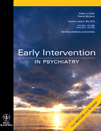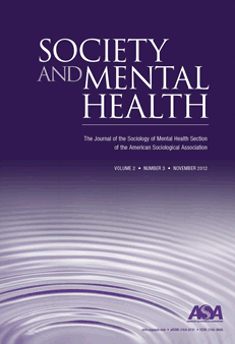
Mental Health and Social Inclusion
Scope & Guideline
Transforming Perspectives on Mental Health and Community Bonds
Introduction
Aims and Scopes
- Mental Health Interventions:
The journal publishes research on various mental health interventions, including therapeutic models, peer support programs, and community-based approaches, highlighting their effectiveness and implementation in real-world settings. - Social Inclusion and Community Well-Being:
A core area of focus is on social inclusion strategies and their impact on mental health outcomes, examining how community engagement can enhance well-being and recovery for individuals with mental health challenges. - Cultural and Socioeconomic Factors:
The journal explores how cultural, socioeconomic, and demographic factors influence mental health experiences and access to care, contributing to a deeper understanding of disparities in mental health. - Innovative Research Methodologies:
It encourages the use of innovative research methodologies, including qualitative studies, autoethnography, and mixed-methods approaches, to capture the complexities of mental health experiences. - Policy Analysis and Advocacy:
The journal also addresses mental health policy and legislative frameworks, advocating for systemic changes that promote mental health support and inclusion for marginalized populations.
Trending and Emerging
- Impact of Technology on Mental Health:
Recent publications highlight the influence of digital technologies, including mobile health applications and online support groups, on mental health, reflecting a growing interest in how technology can enhance mental health services. - Intersectionality in Mental Health:
There is a notable trend toward exploring intersectionality in mental health, examining how overlapping identities (such as race, gender, and socioeconomic status) affect mental health outcomes and access to care. - Focus on Marginalized Communities:
The journal is increasingly addressing the mental health needs of marginalized communities, including refugees, ethnic minorities, and LGBTQ+ populations, emphasizing the importance of inclusive practices and tailored interventions. - Resilience and Recovery Narratives:
Emerging themes around resilience, recovery narratives, and lived experiences are gaining attention, showcasing the importance of personal stories in understanding and promoting mental health recovery. - Holistic Approaches to Mental Health:
There is a rising interest in holistic approaches that integrate mental health with physical health, social well-being, and community support systems, reflecting a comprehensive view of health.
Declining or Waning
- Traditional Clinical Approaches:
There appears to be a waning focus on traditional clinical approaches to mental health treatment, as newer, community-based, and holistic interventions gain traction in the literature. - Generalized Mental Health Awareness:
The broad theme of generalized mental health awareness campaigns has decreased, with a shift towards more targeted discussions around specific populations and their unique challenges. - Single-Dimensional Research:
Research that examines mental health from a single-dimensional perspective, without considering the complex interplay of social, cultural, and economic factors, is becoming less prevalent.
Similar Journals

IRISH JOURNAL OF PSYCHOLOGICAL MEDICINE
Innovating the Future of Psychological ScienceIrish Journal of Psychological Medicine, a prestigious publication by Cambridge University Press, stands at the forefront of research in the domains of applied psychology, psychiatry, and the history and philosophy of science. With its inception in 1968 and a continuous publication record from 1989 to 2024, this journal maintains a significant impact factor, reflecting its esteemed position in the academic community, particularly denoted by its Q1 and Q2 rankings across various categories. The Scopus rankings further emphasize its importance, showcasing its rank in the 90th percentile in Psychiatry and Mental Health, and 98th percentile in History and Philosophy of Science. Although not an open-access journal, it offers a vital platform for disseminating cutting-edge research and insights that contribute to the evolving fields of mental health and psychological well-being. This journal is indispensable for researchers, clinicians, and students who are eager to keep abreast of the latest developments and evidence-based practices in psychological medicine.

PSYCHOLOGICAL MEDICINE
Shaping the future of psychological and medical understanding.PSYCHOLOGICAL MEDICINE is a leading journal in the field of psychiatry and psychology, published by Cambridge University Press. With its ISSN 0033-2917 and E-ISSN 1469-8978, this journal has firmly established itself as a premier platform for cutting-edge research since its inception in 1970. It consistently ranks in the top quartile for both Applied Psychology and Psychiatry and Mental Health, reflecting its exceptional impact in the field, with a 2023 Scopus ranking of #36 out of 567 in Psychiatry and Mental Health, and #21 out of 249 in Applied Psychology. The journal aims to publish comprehensive studies that explore the interplay between psychological phenomena and medical health, contributing vital insights that advance both theoretical understanding and clinical practice. Although it is not an Open Access journal, PSYCHOLOGICAL MEDICINE remains a vital resource for researchers, professionals, and students committed to the scientific investigation of mental health issues.

AGING & MENTAL HEALTH
Transforming Understanding of Mental Health in Older AdultsAGING & MENTAL HEALTH, published by Routledge Journals, Taylor & Francis Ltd, is a leading academic journal that focuses on the dynamic intersection of aging and mental health, critically addressing issues pertinent to geriatric psychology and psychiatry. Established in 1997, this journal covers a wide range of topics including mental health disorders in older populations, cognitive decline, and social implications of aging. With an impressive reputation, it currently ranks in the Q1 category in Geriatrics and Gerontology, Gerontology, and Psychiatry and Mental Health, showcasing its significant contribution to these fields. The journal is recognized for its high-quality, peer-reviewed research and holds esteemed positions in Scopus rankings, emphasizing its relevance and impact in psychiatric nursing and gerontology. While it does not offer open access, AGING & MENTAL HEALTH remains a vital resource for researchers, professionals, and students dedicated to advancing our understanding of mental health in the aging population.

International Journal of Mental Health Systems
Shaping policies and practices for a healthier tomorrow.Welcome to the International Journal of Mental Health Systems, a premier open-access journal published by BMC since 2007. With a dedicated focus on advancing the field of mental health, this journal plays a pivotal role in disseminating transformative research that influences policies and practices across various healthcare systems. Based in the United Kingdom, it boasts a distinguished reputation, reflected in its impressive Q1 rankings in Health Policy, Psychiatry and Mental Health, and Public Health domains as of 2023, underscoring its impact on both academia and clinical practice. The journal's commitment to accessibility ensures that researchers, professionals, and students can engage with high-quality scholarly articles that explore critical issues and innovative solutions in mental health care. Join a global community of thinkers as we navigate the evolving landscape of mental health systems, fostering collaboration and enhancing the delivery of care for diverse populations.

Child and Adolescent Mental Health
Championing Mental Health for Children and Adolescents.Child and Adolescent Mental Health is a premier interdisciplinary journal published by WILEY, dedicated to advancing the understanding of mental health issues in younger populations. With an ISSN of 1475-357X and an E-ISSN of 1475-3588, the journal has established a strong foothold in the academic community, evidenced by its impressive impact factor and high rankings. As of 2023, it proudly holds a Q1 classification in both Pediatrics, Perinatology and Child Health (ranked #18 out of 330) and Psychiatry and Mental Health (ranked #74 out of 567), illustrating its significant contribution to scholarly discourse and research in these vital fields. The journal aims to publish rigorous and innovative research from 2005 to 2024, offering comprehensive insights that benefit researchers, clinicians, and policy-makers focused on child and adolescent mental health. While the journal is not open access, its content remains a key resource for those dedicated to improving mental health outcomes for young people, further bridging the gap between academia and practical application.

Early Intervention in Psychiatry
Elevating Mental Health: The Journal of Timely InterventionsEarly Intervention in Psychiatry, published by WILEY, is an esteemed academic journal dedicated to advancing the field of psychiatry and mental health through rigorous research and innovative practices. Established in 2007 and continuing through 2024, this journal serves as a critical resource for researchers, clinicians, and students interested in the early detection and treatment of psychiatric disorders. With an ISSN of 1751-7885 and an E-ISSN of 1751-7893, it is recognized for its significant contributions, placing in the Q3 quartile in Biological Psychiatry and Q2 in Psychiatry and Mental Health as of 2023. The journal boasts impressive Scopus rankings, being placed 12th in Nursing - Psychiatric Mental Health and 27th in Neuroscience - Biological Psychiatry, showcasing its impact within the scientific community. While not an open-access journal, its findings are pivotal for those seeking to enhance mental health interventions. Early Intervention in Psychiatry is committed to fostering knowledge and improving practices that ultimately contribute to better mental health outcomes globally.

INTERNATIONAL JOURNAL OF BEHAVIORAL MEDICINE
Advancing Insights in Behavioral MedicineInternational Journal of Behavioral Medicine, published by Springer, is a leading academic journal dedicated to the scientific exploration of behavioral factors in health and illness. With a distinguished ISSN of 1070-5503 and an E-ISSN of 1532-7558, the journal has been at the forefront of interdisciplinary research since its inception in 1994, converging towards its upcoming milestone in 2024. Operating from One New York Plaza, Suite 4600, New York, NY 10004, United States, this journal is recognized for its high impact, being ranked in the Q2 category of Applied Psychology with a commendable position of #86 out of 249 in the Scopus rankings, placing it in the 65th percentile. The International Journal of Behavioral Medicine aims to enhance understanding of how behavioral, psychosocial, and cultural factors influence health outcomes, making it an essential resource for researchers, practitioners, and students invested in the relationship between behavior and health. Its rigorous peer-reviewed approach provides a platform for innovative research and discussions that shape the future of behavioral medicine.

COMMUNITY MENTAL HEALTH JOURNAL
Exploring the intersection of research and community mental health.Community Mental Health Journal is a leading publication in the field of mental health, managed by Springer and based in the United States. Since its inception in 1965, this journal has provided a critical platform for advancements in mental health research and community practices, with a convergence set to continue until 2024. It boasts an impressive impact factor and ranks in the first quartile (Q1) for Health (Social Science) as well as Public Health, Environmental and Occupational Health, underscoring its significance in interdisciplinary scholarship. The journal caters to a diverse audience, including researchers, practitioners, and students, fostering a deeper understanding of community mental health issues. With a commitment to highlighting innovative research and practical applications, the Community Mental Health Journal serves as an invaluable resource for those dedicated to improving mental health outcomes in communities globally.

Society and Mental Health
Illuminating the Social Dimensions of Mental HealthSociety and Mental Health, published by SAGE Publications Inc, stands as a leading journal dedicated to the intricate interfaces of society and psychology. With its ISSN 2156-8693 and E-ISSN 2156-8731, the journal has firmly established itself within the realms of Psychiatry and Mental Health as well as Public Health, Environmental and Occupational Health, achieving a remarkable ranking of Q1 in both categories as of 2023. Operating from the United States, this influential journal, in publication since 2011, spans a comprehensive convergence of research and discourse, culminating in significant insights that shape contemporary understandings of mental health's societal determinants. Despite its non-open access nature, Society and Mental Health maintains an impressive impact, bolstered by its Scopus rankings, which place it in the 93rd percentile in Public Health and in the 90th percentile in Psychiatry. By inviting contributions from researchers, professionals, and students alike, the journal aims to illuminate the social contexts of mental health, promoting a dialogue that is essential for the advancement of both theory and practice in this critical field.

PSYCHIATRIC REHABILITATION JOURNAL
Leading the Charge in Psychiatric RehabilitationPSYCHIATRIC REHABILITATION JOURNAL, published by the Educational Publishing Foundation of the American Psychological Association, is a premier source of scholarly information and innovative research in the fields of psychiatric care, rehabilitation, and mental health. With its ISSN 1095-158X and E-ISSN 1559-3126, this journal has established itself as a leading platform, evidenced by its top-tier rankings — notably in the Q1 category for Health Professions (miscellaneous) and Rehabilitation, as well as a respectable Q2 ranking in Psychiatry and Mental Health for 2023. The journal's convergence of scholarship from 1996 to 2024 underlines its longstanding commitment to advancing evidence-based practices and improving outcomes for individuals facing psychiatric challenges. Indexed in Scopus with robust rankings (e.g., Rank #8/78 in Health Professions), it serves as an essential resource for researchers, practitioners, and students dedicated to enhancing the quality of rehabilitation and mental health care in the United States and beyond. While the journal does not offer open access, its impact factor and professional relevance continue to make it invaluable for those engaged in the vital work of psychiatric rehabilitation.